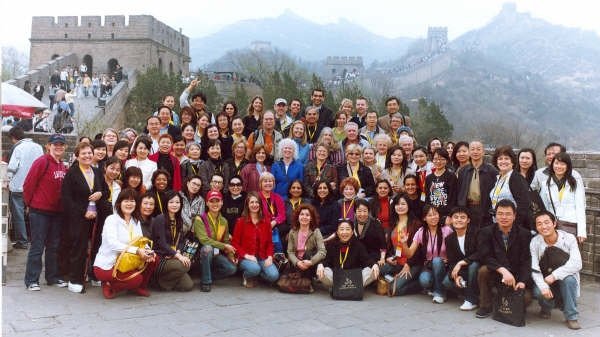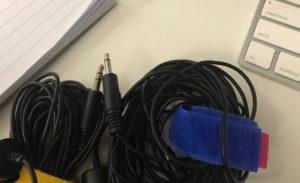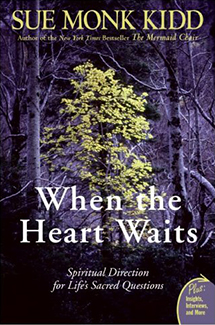Giving up the life of the road (or the airplane) is partly how I ended up at GCC. I’ve been a long-time traveler. Although I was born in Arizona where my father finished his structural engineering degree at the University of Arizona, my parents and I moved within eight months to Minnesota. A few years later we moved to Colorado. I lived in so many different places in Colorado, depending on the university I was attending or the degree I was seeking in Denver and Boulder, that my mother finally started using pencil to update my address in her address book. My roots are scattered because of this constant moving.
Two years before we moved to Arizona, my husband, son, and I went to Estonia for a year while I taught as a Senior Fulbright Scholar at the Academy of Music and Theater in Tallinn. Everyone told us it was not the “going on” a Fulbright that would be hard, but “returning from” our year away. They were right. We had changed and the only way to live with that change was to change our surroundings. We moved.
My husband, son, and I had been living in Arizona for about a year, and I’d spent most of that year working and traveling as a Composer or Producer-in-Residence back and forth to Minnesota, as well as to Rome, Beijing, Toronto, Milwaukee, Pittsburgh, Atlanta – well you get the idea. My long travels ended when I came home and was greeted by my nine-year-old son, who was just waking up, when he said, “Mommy, are you really here or am I just dreaming?” Ach! It was a knife in my heart! He had never mentioned that he missed me and certainly not this much! I decided if I did travel it would only be for short trips and only occasionally from then on.
Before you ask, “What kind of a mother are you?” you need to know that my son is autistic and has always been very accepting of me going away; with a kind of “bye, see ya” sort of attitude. He loves to be alone, and it’s difficult, sometimes, to accept that. To give you an example, my husband and I went on a business trip back in 2018 (yes, he’s a musician, too), and left our son at home with the dog (by this time he had graduated from high school with honors and was capable of being alone – but it was an experiment because we would be further away – so we had support people at the ready if he needed someone). When we returned my husband kept coming back in from the garage before he left for work to make sure our son was okay with him leaving, and asked him so, and our son, who has a great sense of humor, said, “Less talking, more leaving!” From that response, although ten years later, we knew he didn’t miss us that much while we’d been gone.
Jumping back ten years, I applied to teach at GCC. The first word I think of when I remember my first days at GCC is “friendly.” I found everyone friendly and helpful. The two communities that first welcomed me were the Music Department (aka Performing Arts) and CTLE.
Before this, I’d been teaching for twelve years, after my doctorate, at two private institutions (three, if you count my alma mater – which is public) in Minnesota, so I knew my way around lots of subjects, but I knew there was a program called Blackboard, among others, but no one would teach me about it. Over the years, I had also been offered five full-time positions in Minnesota, strictly a phone call – “we’d love to have you come work for us,” but my health was not good when I was offered a few of them, and the other, which I would have loved to take, was offered just as I was receiving my Fulbright. I couldn’t take the job knowing I wouldn’t be there that next year. Also, and you’ve heard this from others if you haven’t said it yourself, the winters were about eight months long and I just couldn’t take that kind of cold anymore. I was looking to take my roots somewhere warmer although I had not planned it to be this warm.
The Music Faculty shared their syllabi, what needed to be in a syllabi technically, how to find my courses, and helped me get up to speed within a few days! I hardly knew what had hit me, but I really enjoyed the people I met. They have become friends and some of the best people I’ve worked with. I’ve missed seeing them during the pandemic at meetings and performances. We recently met in person for the first time in two years and my heart sang for hours afterwards, having been able to see so many friends again. It is truly an anomaly to have this many good people together in one department – and that includes the whole Performing Arts Department as well.
I discovered the other GCC community shortly after I started when I signed up to learn how to teach online. No one had asked me to learn this, but I saw this as a possible future — need I say more? That introduced me to Karen Russo and CTLE. For several years I took everything that CTLE offered, free seminars on teaching and best practices, free offerings on other online programs for use in online courses, district workshops, designing courses for E-readers, and master classes on being a better educator. I’ve gotten to know almost everyone in the department, and I’ve met other equally friendly and helpful educators as the department expanded.
I now have been teaching exclusively online for a little more than 10 years, and love it. I still take a workshop here or there, although mostly on Zoom or Google lately. CTLE has patiently answered questions and solved problems for me. I have learned more from them about successful teaching than I had ever known and I am thankful for it. I applaud CTLE for what they have offered through the years so I could become a better teacher of music. The Music Department and CTLE has allowed me to put down some strong roots in this community.




 I have to admit I’m borderline burnout, but what keeps me going these days are the people I work with on a daily basis. My inspiration comes from all of those faculty and staff who take the time to better themselves and be the best they can be and utilize the CLTE to help them with that. I can’t be a slacker around these folks. Oh no, so I’m inspired to step my game up and help provide the services they need, and it reminds me of why I’m doing this job in the first place. It’s easy to forget at times.
I have to admit I’m borderline burnout, but what keeps me going these days are the people I work with on a daily basis. My inspiration comes from all of those faculty and staff who take the time to better themselves and be the best they can be and utilize the CLTE to help them with that. I can’t be a slacker around these folks. Oh no, so I’m inspired to step my game up and help provide the services they need, and it reminds me of why I’m doing this job in the first place. It’s easy to forget at times. Last Friday, February 19, from
Last Friday, February 19, from 



